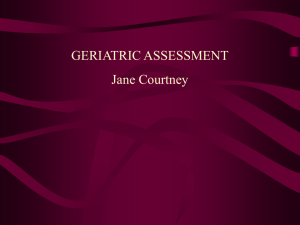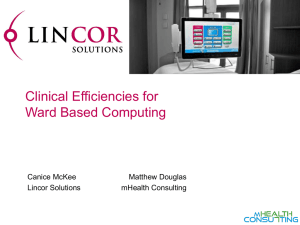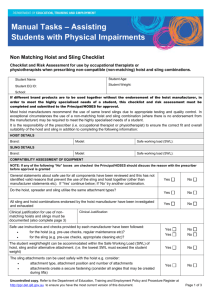The NHS Through The Eyes of a Disabled Person
advertisement
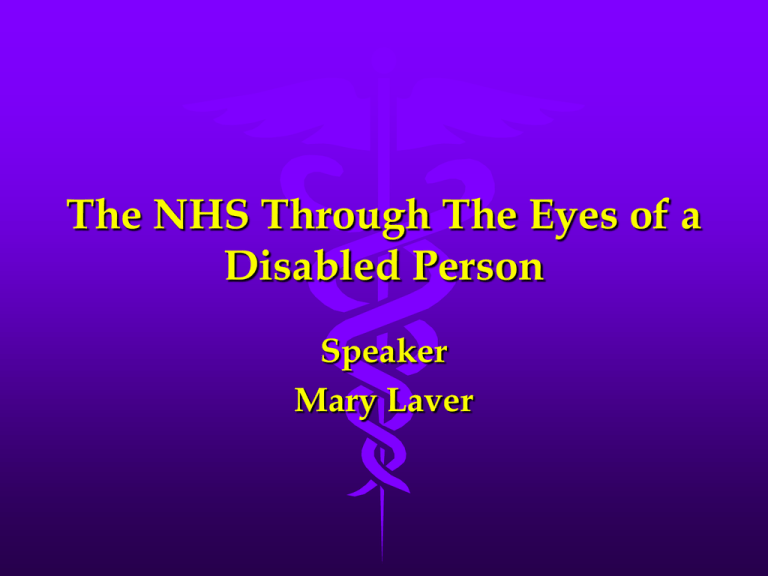
The NHS Through The Eyes of a Disabled Person Speaker Mary Laver The NHS May I firstly say that, in my opinion, I think the NHS is a wonderful organisation. Thank you all for working in the NHS because with out people like you the NHS would not be. The Aim Of This Talk • Communication, listening and learning from each other. • For you to ask any questions of a disabled person who uses your hospitals. • To speak to a care worker about the caring of a disabled person at home. • To help make you aware of the feeling and thoughts of a disabled person who enters your hospital. The Views Expressed Before I start, I would like to express, in the strongest possible terms, that the views expressed are mine and none else's. Other disabled people that attend your hospital may totally disagree with the comments I have made. The time this discussion should take is approximately 45 minis. What do we mean by the word “Disability” There are two definitions British Council of Organisations of Disabled People defines ‘Disability’ ‘Disability is created, not by a person’s impairment, but by the disadvantage, or restriction of activity, caused by a society which takes little or no account of the person who has that impairment.’ The Disability Discrimination Act (1995) defines ‘Disability’ ‘A physical or mental impairment which has a substantial and long term adverse effect on a person’s ability to carry out normal day to day activities.’ Disabled and going into hospital, how do I feel? • Very scared. People are going to be totally responsible for my every day living. • These people do not know me or my condition personally. • They do not know the best way to move me. • They don’t know how to move me to save causing me pain. • They do not know the best way to put me in my wheelchair or on the commode. • How to feed me. • Put me comfortable at night. To name a few. I hope they will listen to me when I tell them how to do these things. So now you have this “Disabled” person on your ward what next? Lets look at the problems I shall bring onto the ward and how you may solve them. Fear • When I go into hospital, which I do on a number of occasions, I am scared. What am I scared off? Not the treatment, the MRSA bug, but the nursing care I am to receive. Sounds a terrible thing to say. Why am I scared of the nursing care? I feel that due to pressure of time, I do not get the quality of care I used to. • Nurses need time to look after me, a lot of time, and they quite simply do not have it. • Meals. I have to have these fed to me, again more valuable time that simply nursing staff do not have. • Getting me up in the morning. I am nearly always the last to be washed and dressed, why? Because it takes 2 nurses and 1 1/2 to 2 hours to do this job properly. • I have to talk them through the way I have to get washed and dressed. • I use a ladies bottle for weeing in. If I am out of my chair I have to be put back on my bed using the hoist to do this. This can take a lot of time and 2 nurses. • Night time. Oh I hate the night time. Some night staff are not very happy when they have to do the little things to make me comfortable. They are always wanting to rush away. When I ring for help, usually for a wee…it can take ages for them to get to me….pain in my tum is a result or worse, a wet bed. Not the nurses fault. I just need so much care. • The chatter of the night staff keep me awake. • They always seem to have loud shoes to walk in. Please Remember The person who knows more about handling their disability lives with it 24 hours per day. ‘The disabled person’ Be guided by them. Be patient if a task is taking a long time. Equipment Expensive Electric Wheelchair. Question…Are your staff familiar with moving an electric wheelchair? If not, why not? What should you be doing about it? Are you insured if you damage the persons chair. Mine cost £13000! I have no option but to come in my electric wheelchair so is it unfair that you dissolve your self from the responsibility of looking after it. The one person who knows how to get in and out of their electric or manual wheelchair is the person in it. Be guided by them. I have found a lot of staff think they know better than me on this one. Wrong. Hoisting • Hoisting can be scary and painful in the hands of someone who knows you. What about someone who does not know you? • Remember. Ask the person who is being hoisted if there is a way to hoist them that is better for them. You will be surprised they may just well know more than you. • On a number of occasions time and pain could have been avoided if I had being listened to. Amby Lift • This piece of hospital equipment is both uncomfortable and scary if you are the patient sitting in it.. • When using this equipment always push your patient in front of you not pull them behind. They may well fall off and you will not notice them. ALWAYS have the wheels on when moving around the ward. Physical Help I Need Physical Help (That is an understatement) • Yes I need help and lots of it. It takes 2 hours of nursing time with two nurses to get me up in the morning. Think of it 4 hours of nursing time each morning I am in the hospital just to get me out of bed! • Think about that. Who knows the best way to give me that help? Me and my home carers. • Who is not in hospital with me to give that help, right, my home care workers. Why not, because they are paid for the job they do and the hospital will not employ the agency to send them in. • Result. Pain, discomfort, lots of valuable time wasted. See where I am coming from? I Cannot Use My Hands • I cannot use my hands, what does that entail? • Feeding. I have to be fed. A night mare. Feeding me takes up a very lot of nursing time due to a swallowing problem. Now where is my home care worker ay! • I have twice had a problem when a nurse giving me my lunch has been told I can feed myself and left me. What happens when I need to summon help when I am in bed? The call button. I cannot press the normal call button and you do not have a easy touch one. What do I do, nothing but your staff have to waste time going over all the hospital to find one with an easy touch. Would it not be better to have such a device on the ward at all times? Equipment & • • • • MRSA. Example of the equipment I will use while in hospital. Nurses call button Hoist/Sling Commode Bed and bed side table Which Of These Can Spread MRSA? All of Them • Nurses call button. Have you given that one any thought? Does anyone clean the nurse call button ever? • Hoist. Nurses seem at most times to have not a clue how to use them. When I, a user of many years, try to advise them I am told to leave it upto them. • Cleaning the hoist. Does it ever get cleaned. I have never seen this happen yet. Hoist Slings • I worry when I am put into a hoist sling. Why? Because that sling will have been used on other patients, usually on bare skin, and not be washed afterwards. What a thought. Solution • When I arrive on a ward I wish the sling I am to use be given to me clean, in a sealed wrapping and left with me all of the time during my stay & for my use only. Beds and Side Lockers • I can assure you that beds and lockers are always not properly cleaned when they are vacated, Believe me, I have seen this happen on many occasions. Commode • I have to use a commode for toileting and showers, well I used to until the MRSA scare now I bring my own. • Why used to. Have you ever seen the commode cleaned after use? I have not. • Cleaning the commode seems to be one of those jobs missed out. Language ‘Being Politically Correct’ Use of wrong language can deeply offend. Please remember that. So what is the right language? Wrong Right • Handicapped /Cripple • Disabled/physically impairment • Sight impairment • Blind • Person with a learning • Downs syndrome difficulty/impairment • A person with an • Deaf hearing impairment • Wheelchair dependent • Wheelchair bound Advice when speaking to a disabled person. • The person who knows their disability the best is the one living with it 24/7 listen to them. • When speaking to someone who is in a wheelchair, make eye contact with them by bending down at the knees. • Don’t shout. We are not deaf. • When we ask a question Do not give the answer to the person we are with unless indicated to do so. • Please do not assume that because we have a speech impairment we are not very bright. We can understand what you are saying to us. Can you understand what we are saying to you? Confidentiality • People with a disability may well not want to discus their medical history or any other personal matters with a nurse or doctor in the hearing of others on the ward. Agreed? • Putting the curtains around the bed does not stop sound! • Ask the patient if they would like to go into a private room to fill in their medical details. • If the patient has a speech impairment make arrangements for someone who can understand them to be present. • Never pretend that you understand what is being said to you. Ask them to repeat what they said as many times as it takes. Tablets, The Giving Of This one is my favourite…. • I take with me into hospital my medi pack. • The rules of your hospital say that if a patient uses a medi - pack the patient must beable to give the tablets to themselves. • I cannot physically do that and you will not accept my medi – pack. • Daft don’t you think! To Sum Up I would suggest the following • Be prepared before hand for the disabled person who is coming onto your ward. • Have any special equipment they need at the ready. • Have a sling clean and ready on their bed if needed. • Above all…Listen to them and take note of what they say. They may make your life much easier. Home Care Worker • A Home Care Worker should be used on the ward if it is in the best interest of the patient and staffing. • That they should come in at agreed times. • That they …………….. Miscellaneous • Getting back onto the ward…Can we have a call button outside wards at wheelchair height. • Waiting areas. No wheelchair places. • Ambulance waiting areas. No assistant when required with eating, drinking, loo ect. This is needed mainly for elderly people waiting on there own for an ambulance. • Deaf people can be missed when called at the out -patience. • Lumber puncher. Will you please NOT do these on the ward. That’s All Folks! Mary Laver

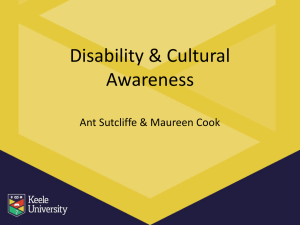
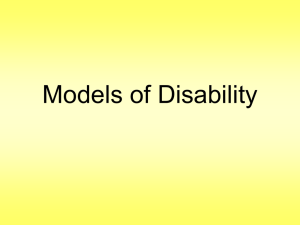
![You can the presentation here [Powerpoint, 1.01MB]](http://s2.studylib.net/store/data/005417570_1-0810139cfc2485ebcaf952e0ae8bb49a-300x300.png)
